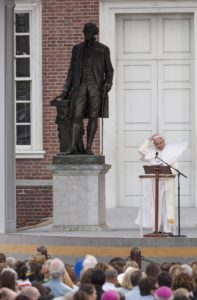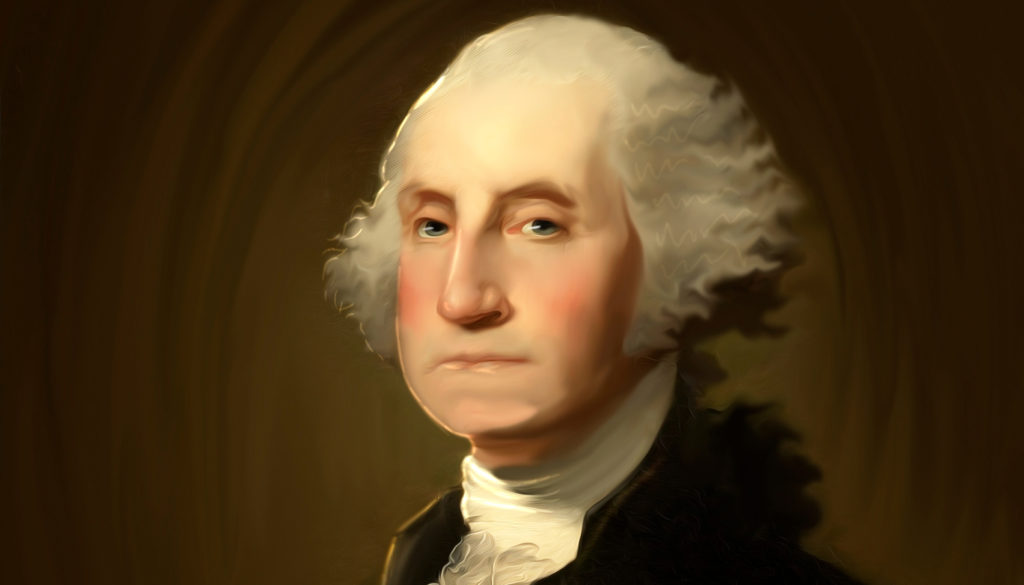You probably didn’t know this, but George Washington once had a brief correspondence with Moses.
Moses Seixas, that is, who back in 1790 was the warden of the Touro synagogue in Newport, Rhode Island. The Bill of Rights was still a year away from ratification, and Washington was the leader of a brand-new country.
Washington was a man of firsts: He was the nation’s first president, the first general of a new army, and one of the first promoters of religious liberty.
He could have been a dictator, but he deferred advice upon his election to the highest office in the land when someone suggested his title should be “sire” and opted instead for the simple “Mister President.” He left most of the heavy lifting of forming a liberal democracy to others. But when it came time to implement some of these lofty revolutionary concepts, he had no equal.
After Washington’s groundbreaking visit to the synagogue, Seixas wrote him a thank-you letter characterizing the event as one of many “…blessings of civil and religious liberty which we enjoy under an equal benign administration…”
There was no instant messaging here, no BTWs, LOLs, or IDKs. This was a time when letters were the sole means of nonverbal communication and, by the 18th century, writing them had become an art form when quills were in the hands of men like Seixas and Washington.
The president’s response to the letter from the warden of the synagogue was characteristically formal and powerful. “May the children of the stock of Abraham who dwell in this land, continue to merit and enjoy the good will of other inhabitants.” Washington was our first ecumenical prophet, too.

But his pursuit of religious liberty did not begin in Rhode Island in 1790, nor at the Constitutional Convention in Philadelphia in 1787, or in 1774, when Washington attended a Catholic liturgy. He was by no means some kind of “secret” Catholic, but his actions meant a lot in light of the recent rules and regulations held fast before the British were uninvited to control the American colonies.
Before the War of Independence, Catholics in only three of the 13 American colonies were allowed to vote. According to the National Council for History Education’s 2016 “Catholics in America” project, “most of the New England colonies and the Carolinas prohibited Catholics from holding office; Virginia would have priests arrested for entering the colony; Catholic schools were banned in all colonies except Pennsylvania. “
In 1775, the year before the Declaration of Independence, General Washington was preoccupied with figuring out how to not be obliterated by the power and might of the British Empire. Yet, he took time to issue an order to his army that had nothing to do with battlement, troop movements, or strategy.
It was November and an anti-Catholic tradition that had traveled well across the Atlantic to the colonies was about to be celebrated. Apparently, Washington’s Continental Army was going forward with their own plans to celebrate Guy Fawkes Day, a day commemorating the failed “Gunpowder Plot” when devout English Catholics attempted to blow up the House of Lords. It was a day of revelry, bonfires and fireworks … and all manner of anti-Catholic mockery. Usually, the festivities ended with the burning of an effigy of the current pope.
It must have come as a shock when Washington’s order filtered down to the common soldier that Guy Fawkes Day had been canceled with a reason given by Washington that was explicitly clear: “As the Commander in Chief has been apprized of a design form’d for the observance of that ridiculous and childish custom of burning the Effigy of the pope.”
Washington was a “black swan” of a person, a once-in-a-century rare person who had the courage of his convictions and the ability to be revered by friend and foe alike. In retrospect, he was idolized so much that he was rendered a one-dimensional cardboard cutout of virtue. Though that is never wise, the pendulum swinging in the opposite direction — in which the tearing down of other forebears like Washington due to their imperfections has become a national pastime — is not culturally healthy, either.
Neither antisemitism or anti-Catholicism ended with Washington’s forward-thinking gestures. And slavery, which was bitterly debated at the Continental Congress in Philadelphia, did not disappear with the deaths of George and Martha Washington and the subsequent emancipation of their slaves. That issue would be addressed more kinetically at places like Shiloh, Antietam, and Gettysburg and would need further work a hundred years later with the Civil Rights Movement.
But the roadbed of religious liberty and civil rights was laid by George Washington and for that, he deserves respect and admiration. So as another Fourth of July comes and goes: Happy birthday America, even with all your flaws, and on behalf of all my fellow Catholics, thank you Mr. President for putting an end to Guy Fawkes Day.

